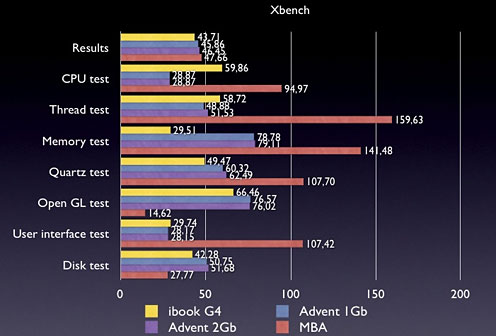The second that Apple made the announcement it was going Intel, it
was only a matter of time before PowerPC was phased out.
Did I look down upon this decision? Yes, I did.
Why? Well because one of the hooks of Macs of the time was the
difference in architecture. With Windows machines, it was the same
bland co-op of Intel, AMD, or VIA.
With PowerPC Macs, it was a rare mixture of hardware. It could be
found in far fewer machines by comparison. After some initial research,
I was hooked, to say the least. So when Apple announced they were
abandoning the PowerPC architecture, I was a bit disappointed.
Fast Forward a Bit
I love my MacBook and MacBook Pro. Now that they've accumulated a
few past generation models, I've gained some more respect for them.
Maybe the Intel switch wasn't such a bad thing after all. Additionally,
OS X has maintained it's stability and gained improved abilities
with the Intel Macs. It's performance really blossomed atop the
dual-core Intel architecture.
I was walking down the street by my house when I spotted a man with
a scraggly beard and severely needing a shower. He was holding a large
sign that said, "The end of PowerPC is near."
My response was simple: "Not in the slightest, my friend."
Realistically, PowerPC is at an end in terms of updates. It's
pretty solid to say that OS X 10.6 "Snow Leopard" will phase
PowerPC out of the latest and greatest operating system builds.
But does that mean my iBook G4 won't perform well
in Tiger anymore? Not in the slightest.
Pseudo-Netbooks
My iBook G4 sits next to me while I type this on my MacBook. It's
happily chugging along, processing some shell scripts. It's 1.33 GHz G4
processor is no slouch. It's ability to play streaming media, stream
music from any of my servers, and run multiple Terminal windows with
remote connections is more than adequately suited.
My 12" iBook, in comparison to an ASUS Eee PC (a common Hackintosh
itself) is not large. Although roughly 1.5 Eee PCs can fit within the
iBook, it's still fairly light, and my favorite feature is it's full
figured keyboard. For me, typing on the Eee PC is clumsy at best.

A 1.33 GHz G4 holds its own against a 1.6 GHz Atom in most tests.
Just in regards to laptops (12-inchers, if we want to maintain the
definition of a netbook), the G4s have officially become netbooks.
There was a comparison recently done
between an MSI Wind Clone and a 1.33 GHz G4 iBook (images above and
below adapted from that article). The iBook held it's own in terms of
daily performance and had twice the battery life compared with the
netbook's standard 3-cell battery. Don't forget, however, that iBooks
run much slower system buses and a previous generation of RAM.

The iBook G4 has over twice the battery life of a base netbook.
Now, for the juicy part, the part you've all been waiting for. Price
comparison.
I'm using the 12" 1.33 GHz iBook as my base price point for the
G4s.
- The cheapest I could find an iBook G4 without going to eBay was
$417 (1 GB RAM, 40 GB hard drive, Combo drive).
- The cheapest I could find a 1.33 GHz PowerBook G4 without going to
eBay was $579 (1.25 GB RAM, 60 GB hard drive, Combo drive).
- The cheapest I could find a baseline MSI Wind was $435 (1.6 GHz
Atom, 1 GB RAM, 80 GB hard drive, webcam, 6-cell battery, no optical
drive).
- A comparably powered ASUS Eee PC comes to $440 (1.6 GHz Atom, 1 GB
RAM, 120 GB had drive, webcam, 6-cell battery, no optical drive).
The comparison is close, with the iBook and PowerBook lacking the
larger hard drive and webcam available on the most modern notebooks and
netbooks. However, the iBook and PowerBook have the largest screen and
keyboard, almost as much battery life as the netbooks with 6-cell
batteries, and come with Bluetooth. The PowerBook unfortunately goes
for much more due to it's aluminum case and relative rarity.
All in all, 12" iBooks make great netbooks. They can be found for
relatively cheap, are modestly powered, and well suited for the
purpose. Additionally, they're very backpack friendly. And who could
forget a touch-typist friendly keyboard.
They've said that the (official) end of PowerPC is approaching. I
say nay, just another chapter in the legacy.





